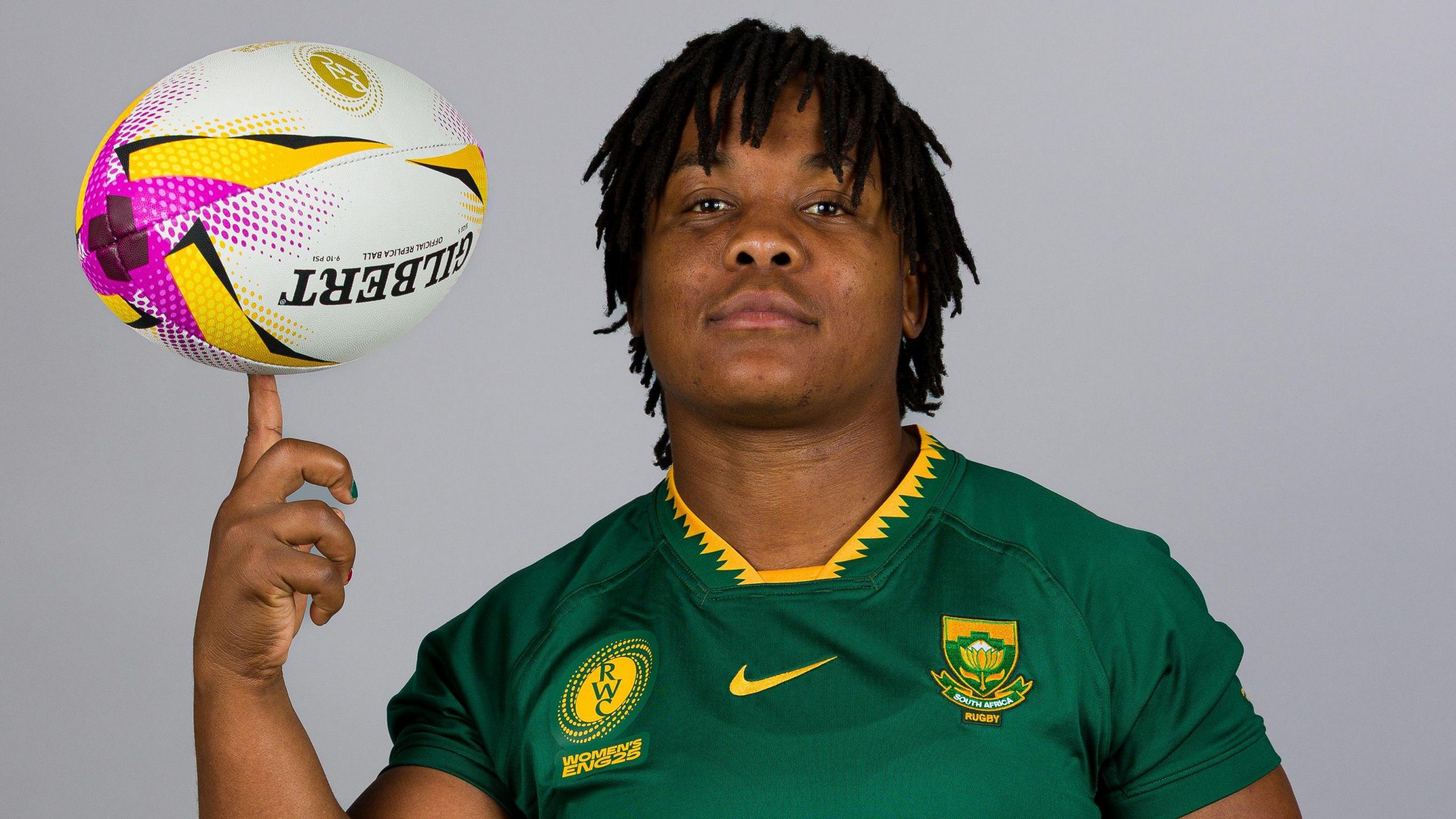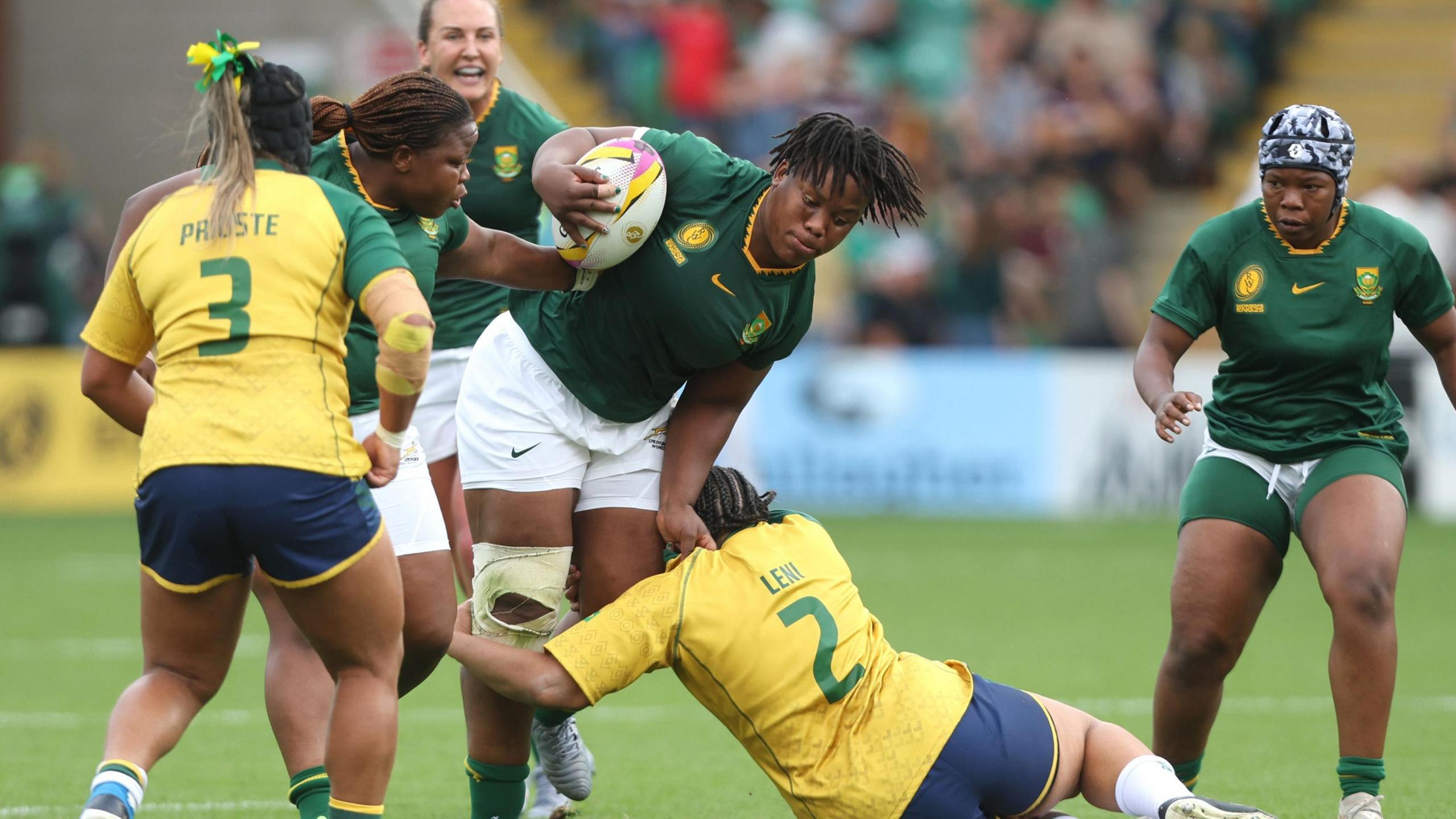The Springboks star campaigning to end period poverty

Babalwa Latsha captained South Africa in their final pool match against France at the ongoing Women's Rugby World Cup
- Published
Babalwa Latsha has helped South Africa to history at the Women's Rugby World Cup, with the team progressing out of the pool stage for the first time, but the prop forward is also aiming to change her country for the better off the field.
The 31-year-old, who grew up in the Cape Town township of Khayelitsha, is campaigning to end period poverty in her homeland.
"I know what it's like to be in need. I know the desperation. I know what it does to your dignity as a human being," she told Newsday on the BBC World Service.
"I've seen it first hand what our sisters go through when we have our periods, not only just at home, even on the sports field.
"I know the discomfort of having to compete and not being comfortable because you just don't have the right protection."
Latsha is a director of the MENstruation Foundation, a non-profit company which aims to provide free sanitary pads to every female in South Africa in a dignified and sustainable manner.
The company estimates that eight million women in the country are unable to afford sanitary products – with half of those in school and tertiary education.
"The statistics are insane," Latsha said.
"We found that girls and young women sometimes use rags, old towels, toilet paper or whatever it is they can find that will help with the bleeding, and that leads to so many health issues.
"Actually, 120 rand ($6.85, £5.05) can cater [for] one woman for an entire year in terms of sanitary products. That's what we are able to provide at the foundation."
The story of Africa's first female pro rugby player. Video, 00:02:48
- Published26 November 2022
'Rugby's changed my life' - Hele's tough rise
- Published12 September
Sport as a vehicle for change
Taboos around menstrual health remain prevalent across Africa, and women's sport on the continent likewise retains a culture of silence.
In 2023, a Women's Health, Wellbeing and Performance research project conducted by football's world governing body Fifa found that about 35% of soccer players based in Africa sometimes use old rags as a substitute for sanitary products.
"We need to break down the stigma that a period is something to be frowned upon," Latsha said.
"It is not, and it never has been.
"Our [target] is really to ensure that every girl stays in sport, stays in school, because they have free access to sanitary products.
"We just find it grossly unjust that a girl should miss out on school because she's on her period. And ultimately our goal is to eradicate period poverty in Southern Africa altogether."
Latsha became the first professional 15-a-side rugby player in Africa when she joined Spanish club Eibar Rugby Taldea in January 2020.
As women's rugby continues to grow across the continent, the tighthead prop is keen to use her profile to benefit others and drive improvements in society.
"Sport gives us platforms that ordinarily we wouldn't have access to, and it gives us a voice," she explained.
"Me lending my voice to such an important cause is very important, because sport is a vehicle for change as far as I'm concerned.
"We therefore can reach as far and as wide as we possibly can. The more people can get involved the better we can be able to change our world."
'No-one else should have to use rags for sanitary pads'
- Attribution
- Published28 May 2023
Progress with the Women's Boks

Babalwa Latsha says the growth in the women's game displayed at this year's World Cup is "incredible"
On the pitch, South Africa made history reaching a first Women's Rugby World Cup quarter-final thanks to pool-stage victories over Brazil and Italy.
The Women's Boks lost all three of their games at the 2021 edition of the tournament, having missed the 2017 finals altogether.
Their struggles are a contrast to South Africa's men, who are record four-time Rugby World Cup winners.
"I think the tide has turned and we've garnered so much momentum, which hopefully will lead into the right direction - being that women should become a fully professional entity in South Africa," Latsha said.
"I think brands and businesses are starting to see that investing in women's rugby and women's sports makes financial sense.
"Those are things that 10, 15 years ago were unheard of.
"[But] we aren't going to get lost in too far into the future. I think we need to look and be where our feet are first and to make every performance count."
South Africa face a daunting task in the last eight when they face New Zealand in Exeter on Saturday (12:00 GMT).
The Black Ferns are rated as the third-best side in the world and are seven places above South Africa in the global rankings.
However, Latsha is looking at the bigger picture, and the development of the women's game which has been displayed at this year's tournament in England.
"The amount of work and progression that has happened since the last World Cup has been immense," she said.
"I think that finally there's some type of reward for the work that has been happening.
"New barriers have been broken and new pathways have been created. That is the beauty of this particular World Cup - to see the growth of various teams, not just us, has been incredible.
"I believe that as the tide rises, so do other boats."